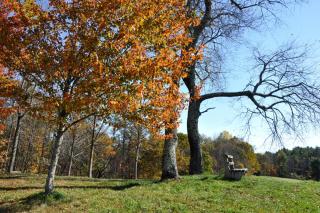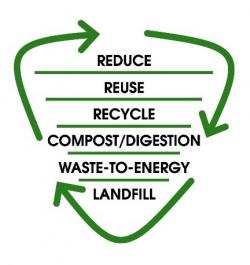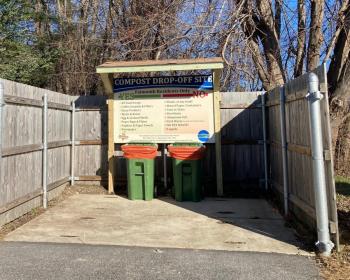Town of Falmouth Sustainability Newsletter - Fall 2021

FOOD WASTE EDITION
A note from the editor
For me, September has always felt like an opportunity for new beginnings. Students are starting a new year of school, summer “vacation” mode winds down to make way for fall projects, and the crisp air clears the mind and prompts us for inspiration. It can be a good time to change our habits and create a new routine. One potential new habit that we’re focusing on in this newsletter is composting food waste. Falmouth offers many opportunities to help residents make composting a part of their everyday routine.In this edition of the Sustainability Newsletter,
we’re diving into the food waste process and answering your questions, including:- Why should I compost? The impact of food waste on the waste stream
- How do I compost? What to separate from your trash and how to dispose of it.
- Can I fit it into my routine? Hear from Falmouth resident, REAC member, and mom, Audrey Hotchkiss on her experience.
I hope that you find this information helpful and motivating. Enjoy this beautiful fall season!
- Ashley Krulik, Falmouth Sustainability Coordinator
Why Compost?
Organic waste, specifically food waste, has shown to be a significant contributor to greenhouse gas emissions globally. It’s estimated that disposing one ton of edible food can result in 2.5 tons of full lifecycle carbon dioxide emissions! Key factors that contribute to these emissions include production, transportation, and disposal. To reduce these emissions -
- Reduce waste. Try to buy only what you will eat. Meal planning, observing what you throw out each week, and buying less (you can always get more!) than what you think you need are helpful strategies. This is tricky to plan for but saves money and waste in the long run.
- Buy local. The closer your food is produced; the fewer transportation emissions are associated with getting it to your door. Better yet – try planting a climate victory garden, putting food at your fingertips. There is no better time than winter in Maine to thumb through seed catalogues and plan new gardens for the spring.
- Compost. Falmouth’s solid waste manager, ecomaine, is known for their efficient waste-to-energy plan that creates energy by burning our trash. But wet, gooey, heavy food waste reduces this efficiency. The less food waste that is included in trash bags, the more efficiently energy will be produced. It also saves on the number of trash bags that you’ll need to purchase as well! Lastly, by composting, disposal isn’t the last step in the food lifecycle. It goes on to become nutrient-rich fertilizer that helps to grow more food!
How to Compost
- Separate your food waste from your trash. You can keep a small bin on your countertop or under your sink and empty it into a larger bin outside. Find a method that is convenient and realistic for you. It’s OK to start small and build from there!
- What can you compost?
- All food scraps
- Coffee grounds & filters
- Dairy products
- Meat & bones
- Egg & seafood shells
- Paper bags & plates
- Napkins & paper towels (Only if they haven’t been used with cleaning solutions)
- Newspaper
Never compost plastics, metals, or glass.
- OK, now I’ve got it, how do I get rid of it? Falmouth offers multiple composting options to residents:
- FREE Food Waste Kiosks. These kiosks are serviced by WeCompostIt, who takes the food waste and makes nutrient dense compost. Bring your food waste to these drop off kiosks:

- Transfer Station (during opening hours)
- Community Park on Winn Rd. (anytime!)
- Village Park, next to Casco Bay Ice Arena (anytime!)
- Backyard composting bins – available for purchase at Public Works. The beauty of creating your own compost is that then you have it easily available when your lawn and gardens need it.
- Fee-based subscription collection - Check local listings for companies offering food waste curbside collection services in Falmouth.
Get more info about what you can compost and your food waste disposal options.
GUEST COLUMN
The Next Generation of Composting
Written by Audrey Hotchkiss, REAC Member

My first introduction to composting was by way of my grandmother. We would visit her in the 1980s and 90s, a time of flashy packaging and food-turned-fluorescent but there she was, with this silver trash can on her countertop. Food was food and not to be dumped in the garbage can. Aside from the practicality of not attracting animals to her rural Vermont home, this type of meticulous trash management was a mystery to me. As I grew, I asked questions, and found out that the tiny silver trash can was a collection point for her compost, a place where food returned back to the earth rather than filling garbage dumps or being incinerated.
The reality of introducing compost to my life was logistically impossible through college and apartment rentals without the outdoor spaces or resources to adequately compost. Enter: the advent of curbside composting options around 2013 when, for a small monthly fee, it became as simple as putting a sealed bucket out with our bags and recycling bin on trash day. With sentimentality for that silver countertop compost bin at my grandmother’s house as inspiration, I signed up immediately.
At first, the commitment to compost was purely an effort to do well by the earth. If someone says composting is better than incinerating, then I believe them and I will try. Very quickly the additional benefits of transitioning to composting food waste residentially became clear.
Financially, the effort of composting is either cost neutral or saves money. We have to purchase town trash bags and what used to be a weekly output of 1-2 large town bags a week suddenly and delightfully reduced to 1-2 large town bags per month. It turns out most of what we were putting in the trash bags was smelly, heavy food waste. The money we saved on trash bags went towards our compost service fee and, if we were composting in our backyard at the time there would have been actual savings realized.
Then there’s a matter of smell. We found that by keeping our compostable waste in a sealed 10-gallon bucket that the smells in our kitchen and trash area actually reduced dramatically. With some strategic collecting and opening of the bucket our kitchen and garage rarely smell like bananas, coffee grounds or worse.
It has been about 7 years since our family began composting and some modest estimates indicate that over this time just two adults and one child have diverted five tons of food waste from the incinerator at ecomaine. It’s so exciting to realize these impacts, and we look forward to adding a backyard composting system, and maybe even one of those mysterious tiny, silver countertop trash cans to our composting tool kit in the near future.

